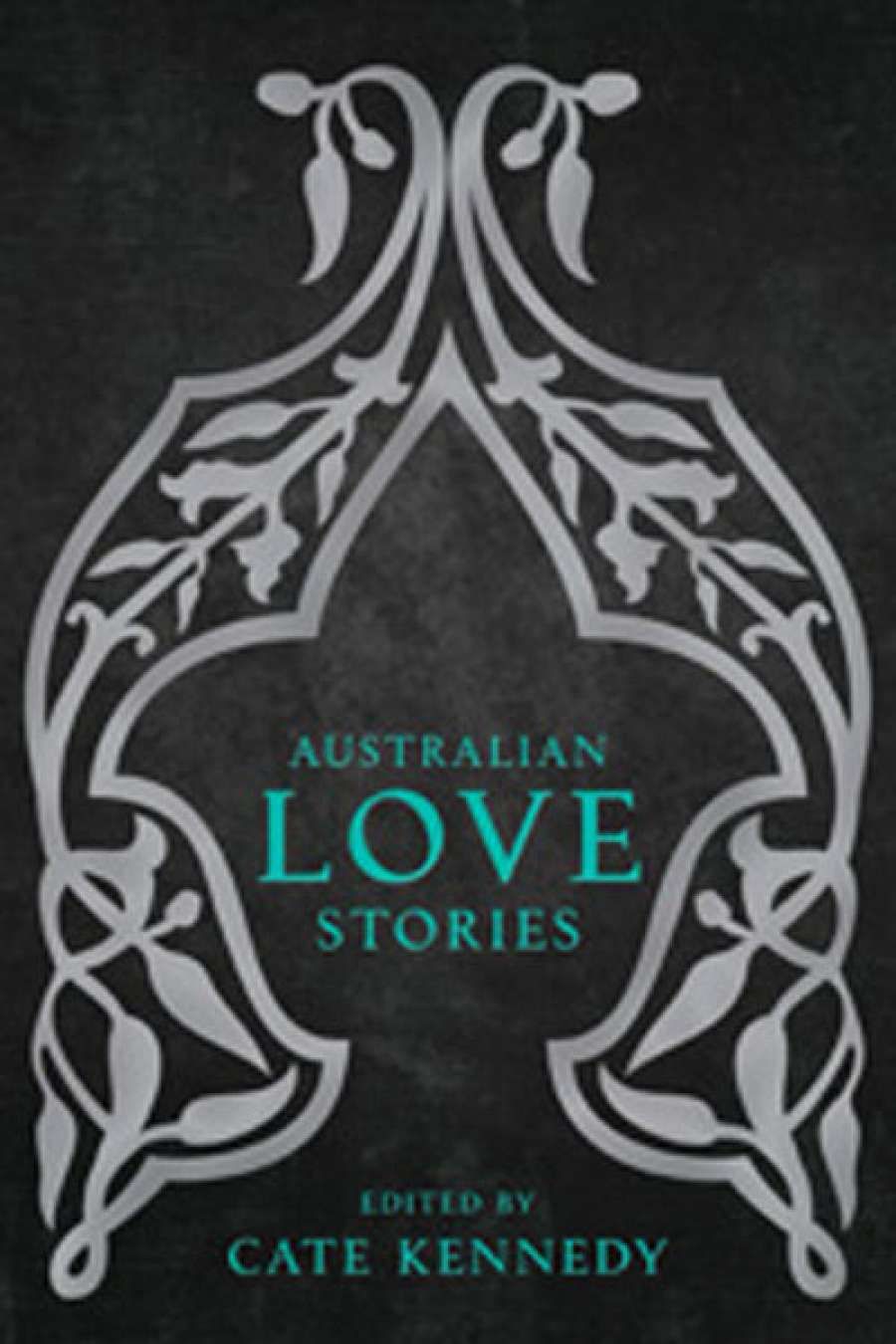
- Free Article: No
- Contents Category: Fiction
- Custom Article Title: Francesca Sasnaitis reviews 'Australian Love Stories', edited by Cate Kennedy
- Review Article: Yes
- Online Only: No
- Custom Highlight Text:
You are perfect for this story. I will never meet you.’ We are invited into Australian Love Stories and into Bruce Pascoe’s erotic reverie with this line from ‘Dawn’. The reader is embraced, as the luxuriating eye of Pascoe’s narrator embraces the recumbent body of the woman beside him. His gaze is illicit, touch forbidden. We are privileged voyeurs, given temporary access to hidden thoughts and lives. Love. This paltry word hardly describes the myriad guises of friendship, affection, homosexual and heterosexual relationship, desire, lust, loneliness, and satisfaction; the gamut of emotions expressed in the twenty-nine stories editor Cate Kennedy selected from the ‘sea of stories’ she received. I do not have enough room here to mention each singular invocation of love by name. Some stories follow the constraints of realism, others are more expressionistic, but each holds a gift – a kernel of some essential truth about the human condition. The ones I mention simply struck a special chord for me.
- Book 1 Title: Australian Love Stories
- Book 1 Biblio: Inkerman & Blunt, $28.99 pb, 304 pp
With cavalier good humour, Catherine Bateson reveals her youthful fantasies in ‘A Literary Love Story’, a memoir dedicated as much to her literary progenitors – Jane Austen, the Brontës, Colette, Anaïs Nin, Fay Weldon – as to the romances they inspired. Bateson classes herself as a Jane Eyre girl, a rescuer of sullen heroes from improbable dangers, and repeatedly falls for men who are more invented than actual. In hindsight she salutes, not her fabricated men, nor the hippy boys who were her real lovers, but her ingenuous younger self.
The boy in Kevin Brophy’s ‘The Lesson’ asks his mother, ‘What would you do? … What if dad came back? … What if I were not here?’, a litany of charges couched as questions. His mother is drinking, in denial, and dealing with her newly abandoned status as best she can. ‘Go away, go away,’ is her reply. But the boy ‘would not go away’. Memories, anecdotes, and speculations follow each other in a repetitive and impressionistic dance: poetry in prose.
It is hardly surprising that ten of the twenty-nine contributors are also poets. The short story form suits a sensibility attuned to the succinct mapping of emotional landscapes, which is not to suggest that the novelists or dedicated short story writers make any less a poetic contribution. David Francis’s ‘Moses of the Freeway’, for example, strikes an elegant balance between contemporary vernacular, brittle dialogue, and expressive description. The narrator’s boyfriend has adopted a child from a Latin country. ‘Sublimated lust,’ he suggests sarcastically. He is falling out of love with his glossy Los Angeles lifestyle and his high-powered partner:
I loved him once, back when he was young and I was younger, when we’d go to flea markets, before he imported chairs from Paris or Buenos Aires. The sweet, vulnerable awkwardness of him. I was the most real I’ve been, almost secure and on the verge of optimism. Back when I was fun.
A stray cat sparks ‘memories paved over like parking lots’. The tempo shifts from allegro to adagio. Ambushed by an old grief, the narrator wonders ‘What’s wrong with me?’ Who has never felt ‘wrong’ like this? Who does not want simply to be held? What relationship is not a process of negotiation? Francis addresses these prosaic questions with poetic intensity.
Leah Swann’s ‘Why Cupid is Painted Blind’ derives from a line in A Midsummer Night’s Dream, and in that light-hearted spirit deals with misaligned lovers and misguided obsession. But Swann’s self-deprecating heroine is not flummoxed by fairies; her mind is blurred by sleepless nights and the demands of single-motherhood. Her attraction to a married man is more than ill advised, and yet she cannot help herself: she drops a poem, which ‘came upon her in a rush’, into his letterbox. Including poetry supposedly penned by the protagonist in a story is a risk, but Swann pulls off ‘unbidden affection’ and, dare I say, Shakespearean romance with finesse.
Debi Hamilton’s ‘The Edge of the Known World’ negotiates the fraught path between friendship, love, and sex. Relationships cross boundaries and are not easily pigeonholed. Friendships are broken because of youthful ignorance, confusion, or fear. There is sorrow in learning the truth too late. Those of us who have not always been brave, who have sidled away from responsibilities, who have not always done the right thing will feel the barb.
The passage of time sweeps through ‘These Bones’ by Allison Browning. ‘’Till death us do part’ was once integral to the marriage vows, but what of the living death of dementia or Alzheimer’s disease? Enzo lives in the past, a shadowy existence. He escapes the nursing home and tries to make his way back to his beloved Nev. The affirmation of loyalty and love unaltered by age and infirmity is heart-rending. It is almost incidental that the couple who stand in the shower and ‘hold each other still, firm as anchors, wet as fishes’ are both men.
Love is a fraught business, but as essential to human survival as drawing breath. The particular delight of this anthology lies as much in individual stories as in Kennedy’s construction of the whole. Her sensitivity to the rhythms of attention is apparent in the alternation of the solemn, tragic, and poignant with the humorous, lyrical, optimistic, or cynical. The stories whisper to each other and are informed by proximity or distance, or, to reprise a musical metaphor from Kennedy’s introduction, the song plays in service to the album.


Comments powered by CComment